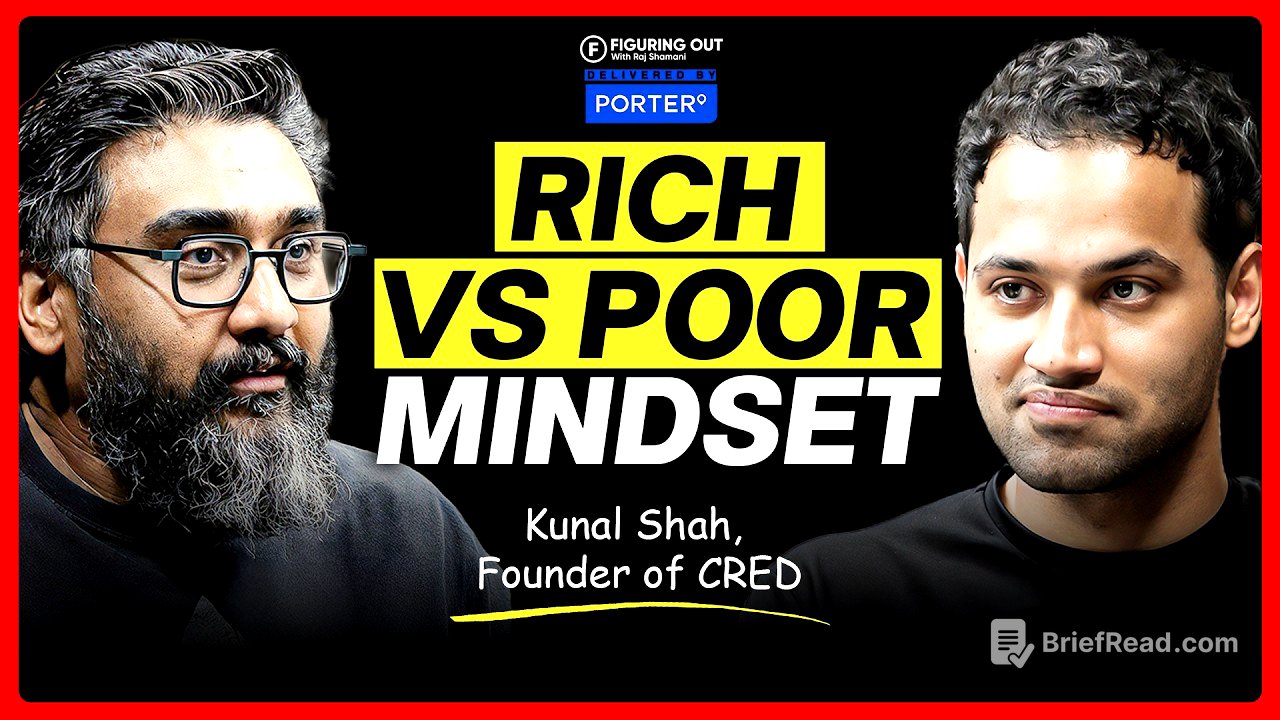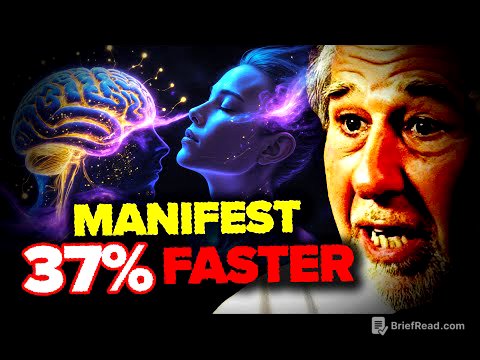TLDR;
Alright, so, this whole podcast episode with Kunal Shah is like a deep dive into success, trust, ambition, and how we're all evolving with AI. Kunal drops some serious ज्ञान bombs about escaping mediocrity, the importance of keeping secrets, and why being trustworthy is a superpower. He also talks about converting fear into curiosity and the trap of social media validation. It's a proper eye-opener, innit?
- Trustworthiness is key to success.
- Convert fear into curiosity.
- Don't get caught in social media validation.
Intro [0:00]
Raj introduces Kunal Shah, the founder of CRED, highlighting his knack for spotting problems and questioning their existence. The episode promises insights into Kunal's fears, motivations, and views on ambition, failure, and trustworthiness. Raj sets the stage for a conversation about what it takes to from being average to extraordinary.
Friendship with Raj [2:29]
Kunal acknowledges Raj's podcasting success, calling it an "elite athlete level achievement". He recalls being nervous during his first appearance on Raj's podcast. Kunal commends Raj for his work ethic, noting that achieving such success is not easy.
Childhood, Kunal as a Person [3:42]
Kunal shares that he was born in Ahmedabad but raised in Bombay. He admits to not being fluent in Hindi, as he thinks primarily in English. He describes his thinking process as a mix of languages and triggers, leading to opinions formed over months or years of observation and pattern recognition. Kunal uses the example of historically shameful behaviors being converted into pride and then normalized, using chatGPT to find multiple examples to validate his observations.
Failure [7:50]
Kunal and Raj discuss failure as a shameful event in India, attributing it to a fear-based upbringing. Kunal explains that Indian society is collectivist, and risky behavior was historically frowned upon. He notes that younger generations are becoming more risk-tolerant due to safer households. Kunal points out that social media followers can also prevent failure, as people fear judgment from their online audience. The deep need to differentiate is frying people's brains.
Fear into Curiosity [18:56]
Kunal says that the best people convert fear into curiosity. He explains that while everyone experiences fear, some convert it into curiosity, propelling them forward. He uses the example of adventure sports enthusiasts and Elon Musk, who are attracted to risk with judgment. Kunal believes that successful people are often driven by a fear of inefficiency or not living up to their potential.
Mediocre People [29:29]
Kunal shares his tweet about mediocre people hanging out with other mediocre people because A+ folks avoid them. He clarifies that A+ folks also feel they're mediocre. He emphasizes that excellence is not accidental but comes from obsession. Kunal says that relationships should teach you something, not just validate you. He suggests spending time with people who make you uncomfortable and not judging the tone of their feedback.
Mocking Someone = Low Status [34:16]
Kunal shares his tweet that all mockery is accepting lower status. He explains that people mock those of higher status to create a tribe, but it's a cheap way to build bonds.
Successful People Don’t Gossip [35:10]
Kunal believes successful people gossip for information and to improve their intelligence. They are extraordinary at keeping secrets. He asserts that wealthy people are good secret keepers, and the moment the second or third generation isn't good at keeping secrets, the wealth goes away. Kunal says he was good at keeping people's trust from childhood.
Being Liked vs. Being Respected [39:38]
Kunal believes people are mostly trying to be liked, not respected, because social media has made likes happen. He explains that respect is a long-term behavior, while like is a short-term behavior. Kunal says that the world is becoming more short-term because society is rewarding that right now. He uses the example of religion as a human invention to make people not do short-term behavior and make them do long-term behavior.
Kunal’s Fear of Escaping [45:15]
Kunal shares that he was escaping the fear of being poor. He says that when you become poor, people distance themselves from you. Kunal says that his fear today is not understanding things and becoming better at things that he doesn't have an understanding of. He is very interested in how AI is going to shape our behaviors.
Relationships Without AI [47:42]
Kunal wonders what will happen to human society if people find human relationships to be suboptimal compared to AI relationships. He believes that having less and less surprises about life requires one to constantly be aware about things. Kunal says that he needs to understand things so that he can build a business with it, understand something, or create something.
How Kunal Uses AI [53:52]
Kunal shares how he uses chatGPT to get feedback on his questions, identify blind spots, and convert documents for different MBTI types. He also uses it to sharpen his hypotheses. Kunal believes that every single person should have an AI auditor of their behavior consistently.
Hard Work Yet Still Poor [58:35]
Kunal believes that people remain poor because they are not working on making themselves irreplaceable and they are not creating something so valuable which a lot of people are motivated to get easily or will pay a lot for. He explains that wealth happens when you take something that people are truly motivated by and make it easy to do. Wealth gets destroyed when you keep making something easy that nobody cares about.
Truth-Seeking vs. Validation [1:04:25]
Kunal differentiates between truth-seeking and validation. He explains that people are truly motivated by health, prosperity, and status for themselves and their family members. Businesses are nothing but building dams on each of these streams. Kunal says that it boils down to what people value and are they valuing it at that point of time or is it likely to sustain.
Why Indians Settle for Average Careers [1:14:12]
Kunal says that Indians settle for settling because we were very poor as a country and stability was important. He believes that the next generation is not choosing for settling because their family is settled. Kunal says that if you are not worried about how you will be taken care of long term, it's okay to be short-term about things.
Becoming Extraordinary [1:18:17]
Kunal says that if you want to become extraordinary, you shouldn't have time to watch this podcast. He believes that any big achievement comes from overcoming many obstacles. Kunal says that comfort zone is a very infertile land.
Misunderstood Ambition [1:21:13]
Kunal says that most ambitious people will never say they're ambitious. They are just doing stuff, building stuff. He believes that drives are very hard to get externally. Kunal says that you can make somebody more ambitious if you are around ambitious people and they feel the need to keep you around.
Aspirations High, Trust Low [1:22:53]
Kunal believes that every human is aspirational because nobody's happy with what they have. He explains that happiness comes from absolutely wanting what you have, and progress comes from absolutely wanting what you don't have. Kunal says that trust comes from the presence of integrity, consistency, competence, and benevolence.
Trusting Apps Over Humans [1:27:31]
Kunal says that we trust digital apps because they can be verified to be consistent. He explains that concentration of trust happens in low trust societies. Kunal says that super apps happen in low trust countries.
Concept of Trust [1:30:21]
Kunal says that trustworthy individuals are trustworthy within their organization also. He believes that trust starts in the building first. Kunal says that your ability to be vulnerable around somebody or something is trust. He explains that if your role is to be a protector, it's different to be vulnerable.
Status [1:43:11]
Kunal says that status boils down to wealth or power. He believes that brand archetypes are not something that you can craft, you are that. Kunal says that he doesn't take himself seriously because nothing really matters.
Failure [1:45:58]
Kunal believes that the mathematical chance of failure is high for every single individual. He says that continuously getting lucky for not being a failure is something that you have to build through observing, pattern recognition, and so on. Kunal says that if someone was to write a book on him and the book title is "Why I didn't make it", the first chapter would be "Did not evolve".
Power & Politics [1:51:18]
Kunal says that people who talk a lot about politics are usually powerless in life. He believes that making an opinion about something will cause people to want to bash you because it's this identity-driven thing. Kunal says that if the average IQ of every person is shown next to their name on Twitter, it'll be a very interesting thought experiment.
IQ [1:58:25]
Kunal believes that in the long run, people will stop giving importance to the IQ number because there's a strong correlation of IQ and wealth, IQ and power. He says that by 2030, very few friends will be smarter than chatGPT. Kunal says that you don't want to be seen supporting an underdog and actually be associated with an underdog who won.
Concept of Respect [2:05:50]
Kunal says that respect is primarily decided by power and money. He explains that humans have a natural ranking system in their head and we follow people we respect or we like. Kunal says that respect is when you see people great at long-term behaviors. He believes that people who are very respected don't easily respect people.
What he chases in Life [2:11:58]
Kunal says that he chases knowledge. He is very averse to fame. Kunal says that the only good use of wealth he has seen is access. He believes that when you chase knowledge and nothing else, people respect you more.
Sympathy [2:21:08]
Kunal says that he used to hide that he was poor because he was afraid that he will be treated with sympathy. He didn't want anybody to give him an opportunity basis sympathy because it's not merit-driven. Kunal says that he is okay to talk about it now because it's just what made him who he is.
Nepotism & Success [2:23:55]
Kunal says that success isn't a club you enter through inheritance, it's earned. He believes that you can get your first movie through influence, but you can't get your 10th movie through influence. Kunal says that unless you build an ability to create wealth, you'll most likely lose wealth.
Greed & Money [2:25:54]
Kunal says that those who are greedy to understand the world get more money in life than those who are greedy to get more money. He believes that being greedy to money is saying that I want to be this guy but I don't want to find the process of how do I get there. Kunal says that the real currency is understanding and skills, money is just a score.
AI & Brain Evolution [2:29:04]
Kunal says that if you do not understand how something works, your brain will not fully develop. He believes that if you were not able to write a single paragraph without AI's help, then you're in big trouble because you'll not even know if AI is in a good job. Kunal is worried about the atrophy that we are going to go through and the dependency on all decision that we take on.
Offense & Insecurity [2:33:30]
Kunal says that he has no memory of getting offended because his filter is of information. He is either curious or not curious, interested, not interested. Kunal says that his insecurity is of becoming not be able to understand something, not able to figure out something.
Indians & Rationality [2:36:54]
Kunal says that it's hard to imagine for rationality to be at the forefront in a society where emotions are celebrated and lack of it is resented. He believes that if you want prosperity, you have to value time. Kunal says that if more people used why, they would be less emotional.
Reputation is Misguided [2:42:23]
Kunal says that most of the young people are worried about the reputation they don't have. He believes that reputation prevents them from learning more things because they're worried about their image too much. Kunal says that they are finding it much more comfortable to ask chatGPT for help.
Shame [2:48:45]
Kunal believes that you'll rarely see success in people who have stopped caring about shame. He says that if you won't be shameless, you won't get the opportunity that you want. Kunal says that if you are reaching out to an investor, if you do not take any effort to find out what kind of stuff this person is likely to react to, you've done zero homework.
How Gen Z Differentiates on Social Media [2:55:16]
Kunal says that all attempts to differentiate end up becoming attempts to belong. He says that Gen Z decides to not post anything to differentiate with older people, but now all Gen Z's do it.
Resourceful vs. Insightful People [2:55:58]
Kunal says that resourceful people create more wealth than insightful people. He explains that insightful people tend to know why things work the way they work, but resourceful people are very good at making money. Kunal says that if you tell a resourceful person a problem, they come to help, not an insightful person. He believes that to become resourceful, you need to remove your shame, reluctance, and resistance.
BTS [2:58:57]
Raj and Kunal discuss the energy of young people's offices.
Outro [2:59:43]
Raj thanks Kunal for the conversation and appreciates the serious juice that goes on in his podcast. He encourages people to appreciate what has happened and says that the conversation can change someone's life.









